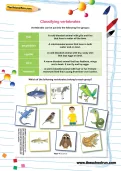TheSchoolRun.com closure date
As we informed you a few months ago, TheSchoolRun has had to make the difficult decision to close due to financial pressures and the company has now ceased trading. We had hoped to keep our content available through a partnership with another educational provider, but this provider has since withdrawn from the agreement.
As a result, we now have to permanently close TheSchoolRun.com. However, to give subscribers time to download any content they’d like to keep, we will keep the website open until 31st July 2025. After this date, the site will be taken down and there will be no further access to any resources. We strongly encourage you to download and save any resources you think you may want to use in the future.
In particular, we suggest downloading:
- Learning packs
- All the worksheets from the 11+ programme, if you are following this with your child
- Complete Learning Journey programmes (the packs below include all 40 worksheets for each programme)
You should already have received 16 primary school eBooks (worth £108.84) to download and keep. If you haven’t received these, please contact us at [email protected] before 31st July 2025, and we will send them to you.
We are very sorry that there is no way to continue offering access to resources and sincerely apologise for the inconvenience caused.
'I help school staff keep my son safe'

“Harris is 11 years old, and he’s allergic to all nuts, and sesame and lupin seeds. He was our first child (we now have Charles, 9, and Clementine, 5), and he was sickly from the beginning with both colic and eczema. Once weaning started, he got unexplained hives, worsening eczema and infections, and red blotches on his face. Some of these were mild, some extreme, and then he had a serious reaction. At 2, he had an allergy test, and we saw a great dietician at the hospital who was a huge help.


Download fantastic science resources today!
- Experiments And Science Fun pack
- Science Learning Programme for each school year
- All the instructions, questions and information you need
“To this day, anaphylaxis is our worst case scenario. If Harris were to eat something he’s allergic to, these are some of the reactions he could get: hives, swelling of the mouth, lips, tongue, face and throat area, difficulty breathing, stomach pains and broken capillaries.
“Shopping for food was a nightmare, and starting nursery traumatic – for us parents, anyway. We visited Harris’s primary school before he started, and asked how they’d managed allergic children. It turns out they’d not had anyone with an allergy as serious as Harris’s before, but there are now a couple of students behind Harris’s year who also have serous allergies.
“Every time Harris gets a new teacher, we have a chat with them and explain about his allergies, as well as how Harris manages them. As Harris has got older, we’ve had him in on every meeting. His primary teachers told me when there would be food in the classroom so I could come in too. For instance, in one maths class the students used different foods to illustrate concepts, and in the end I bought the food myself with money the school gave me.
“We’ve constantly had to find ways to handle lunchtimes, cooking lessons, parties, school trips, making bird feeders out of nuts in Beavers, and even invites for tea – this is especially hard when I don't know the parents, and now that Harris is older, I can't really go too! I provide snacks and foods with long shelf lives that Harris can have on school trips, and I have a swap box system at home – if Harris gets some kind of treat to take home at a party or other event that he can’t have, I swap it over for something that he’ll enjoy just as much.
“It gets quite complicated for schools on where to draw the line when managing allergies – I think schools can only deal with the children they have at the time, and meet their needs. From early on, Harris knew to notice things such as a fellow student having a sesame roll at lunch, so he’d ask to move seats. Harris’s middle school kept photos of all the students with allergies, so teachers would know who to watch out for. We’ve been fortunate to always have a teacher who was organised enough to notify us about any food situations. I’m now used to giving extra training to teachers, coaches and staff on how to use his adrenalin injector (Harris uses an EpiPen) should he need it. I’ve had to work hard to find out about what food Harris will be exposed to at different times, but I see it as our responsibility. It’s our issue, and it’s up to us to flag it up. You can’t rely on other people doing it for you.
“We have left situations where we felt Harris wouldn’t be safe, and people wouldn’t watch out for his allergy. I used to worry that we’d been seen as ‘the parents who cause problems’, but we’ve had to stop worrying about offending people. I’ve become much more vocal about what we need, and have found that lots of parents are willing to make situations safe for Harris at their homes. We’ve found that wherever people take us seriously, we can find a way that works for all of us.
“We’ve taught Harris that he has to say no to an adult if he’s unsure about food he’s given, and that’s hard for a child. But he has to understand this, as it’s his health and his life. Harris just started secondary school and we’ve had to leave him on his own with this, to some degree, but he’s very good at checking things himself. He is still getting support from school; his new school has a cafeteria, and the staff were really helpful in letting us see what they do, how they do it, and to be aware of what food they’ll be getting so Harris will know what’s safe. He’s very accepting of what he needs to do for his allergy, and is very aware of other people’s allergies.
“I can’t praise The Anaphylaxis Campaign enough for all the support and information they’ve given me over the years, and for the amazing people we’ve met through it.”
If you’re worried that your child might have an allergy, ask your GP to administer a simple allergy test. For more information, visit Allergy UK, The Anaphylaxis Campaign and Allergy Education.








